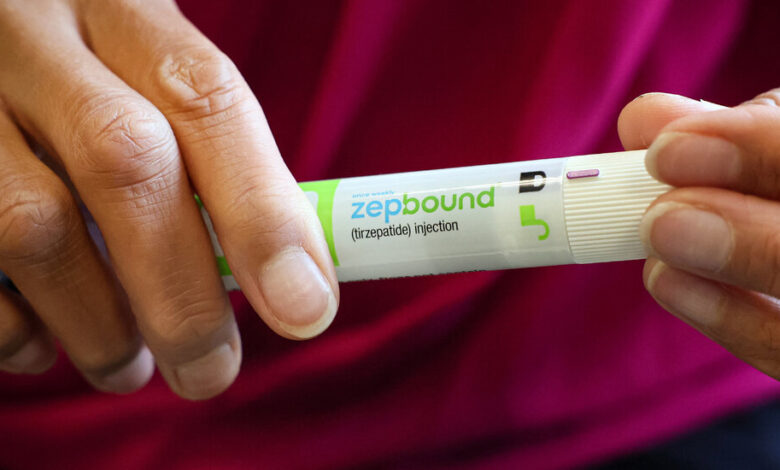Eli Lilly, Maker of Mounjaro and Zepbound, Wades Into Telehealth

The pharmaceutical giant Eli Lilly wants to make it easier for patients to get its buzzy new weight loss drug, Zepbound, delivered to their door.
This week, the company launched a new platform called LillyDirect, which connects people with an independent telehealth company that prescribes obesity medications, as well as third-party services that can fill prescriptions and send them directly to a patient’s home.
“The reason for this is when we talk to patients who are seeking these treatments for obesity, whether it be ours or our competitors’, a lot of people are having a hard time,” said David Ricks, the chair and chief executive officer of Eli Lilly.
Mr. Ricks said the platform will also help patients ensure they are getting brand-name drugs and not compounded versions or the counterfeit medications that have made their way onto the market, and make it easier to access coupons that lower the cost. (The list price for Zepbound is over $1,000 per month.)
Some health care experts and doctors worry that offering medications straight through a drugmaker may make it easier than ever for pharmaceutical companies to target patients with their products — regardless of whether that medication is the right treatment for a particular individual.
“This is just an evolution of direct-to-consumer advertising,” said Timothy Mackey, a professor at the University of California, San Diego, who studies the pharmaceutical industry.
When people go through a portal like LillyDirect, most likely in hopes of accessing a specific medication, they may not end up with the most appropriate treatment or hear about other options, said Dr. Andrew Kraftson, a clinical associate professor in the division of metabolism, endocrinology and diabetes at Michigan Medicine.
“I just find it a bit disingenuous to think that people are just going to get this totally neutral, balanced care,” he said.
Other drug companies — especially those that make weight loss drugs — will most likely follow Lilly’s lead as they look for ways to get their medications to more patients, Dr. Mackey said. “It’s probably going to be an arms race.”
The American College of Physicians released a statement on Friday saying the organization “is concerned by the development of websites that enable patients to order prescription medications directly from the drugmaker,” adding that the approach “is primarily oriented around the use of telehealth services to prescribe a drugmaker’s products.”
“This isn’t medicine,” said Dr. Adriane Fugh-Berman, a professor of pharmacology and physiology at Georgetown University Medical Center. “Medicine shouldn’t be a consumer good, and treatments shouldn’t be commodities.”
Mr. Ricks said that Eli Lilly does not compensate doctors who prescribe its medications through Form, the telehealth platform connected to LillyDirect, and that these doctors have no knowledge that a patient came through the LillyDirect portal. The portal also connects patients to other telehealth companies that can prescribe diabetes and migraine treatments made by Eli Lilly, and has a directory of in-person doctors who treat obesity, migraines and diabetes.
“Of course we advertise to consumers, they go to our websites anyway — here, we’re just making it a click, versus scheduling an appointment, waiting weeks, going into the doctor with all the apprehension that they report about that,” Mr. Ricks said. Doctors have “no obligation” to prescribe Lilly drugs, he said.
Form also prescribes medications not made by Eli Lilly for weight loss, said Evan Richardson, the founder and chief executive of the platform. He added that it has guardrails to ensure that a prescription is appropriate; Form collects medical records from patients to confirm that they meet a B.M.I. requirement and coordinates care with patients’ primary care doctors. (The same day that Eli Lilly announced LillyDirect, the company also released an open letter saying Zepbound and a similar drug, Mounjaro, shouldn’t be used for “cosmetic weight loss.”)
Experts acknowledged that this kind of virtual medicine could help more patients access medications they need, and relieve pressure on overburdened providers. But when it comes to treating obesity, an in-person exam can be critical, said Dr. Melanie Jay, director of the N.Y.U. Langone Comprehensive Program on Obesity.
“You get a much better sense of their functional status. How well are they walking? Are they grimacing in pain when they move? There’s a lot of things you can get by being able to look at a patient when they’re there,” Dr. Jay said. Encouraging patients to obtain these medications via telehealth may mean doctors get an incomplete picture of their health.
Still, a number of telehealth platforms have popped up to prescribe medications for weight loss, some of which are in short supply due in part to overwhelming demand. The virtual care company Ro blanketed the New York City subway in ads for its program offering online prescriptions of weight loss drugs. WeightWatchers now has an online clinic that prescribes these drugs.
“You think, ‘Why don’t more people do this?’ from a business standpoint,” said Dr. Kraftson. “But from a medical standpoint, it does concern me.”
Source link



